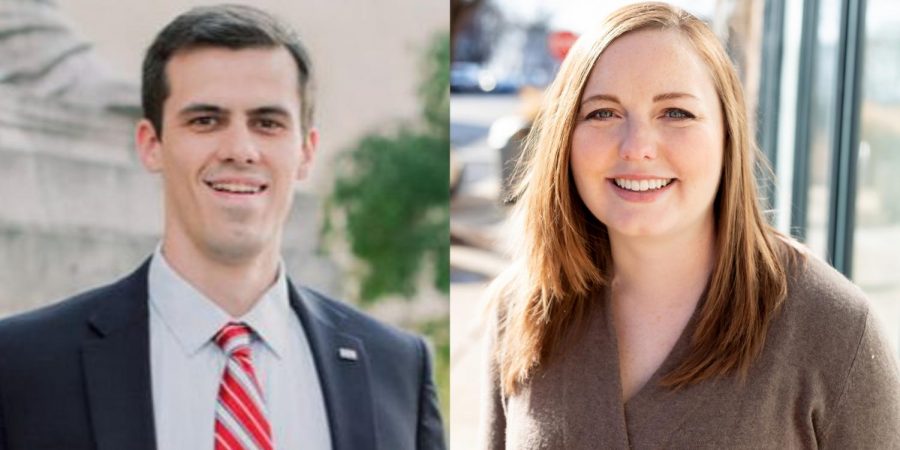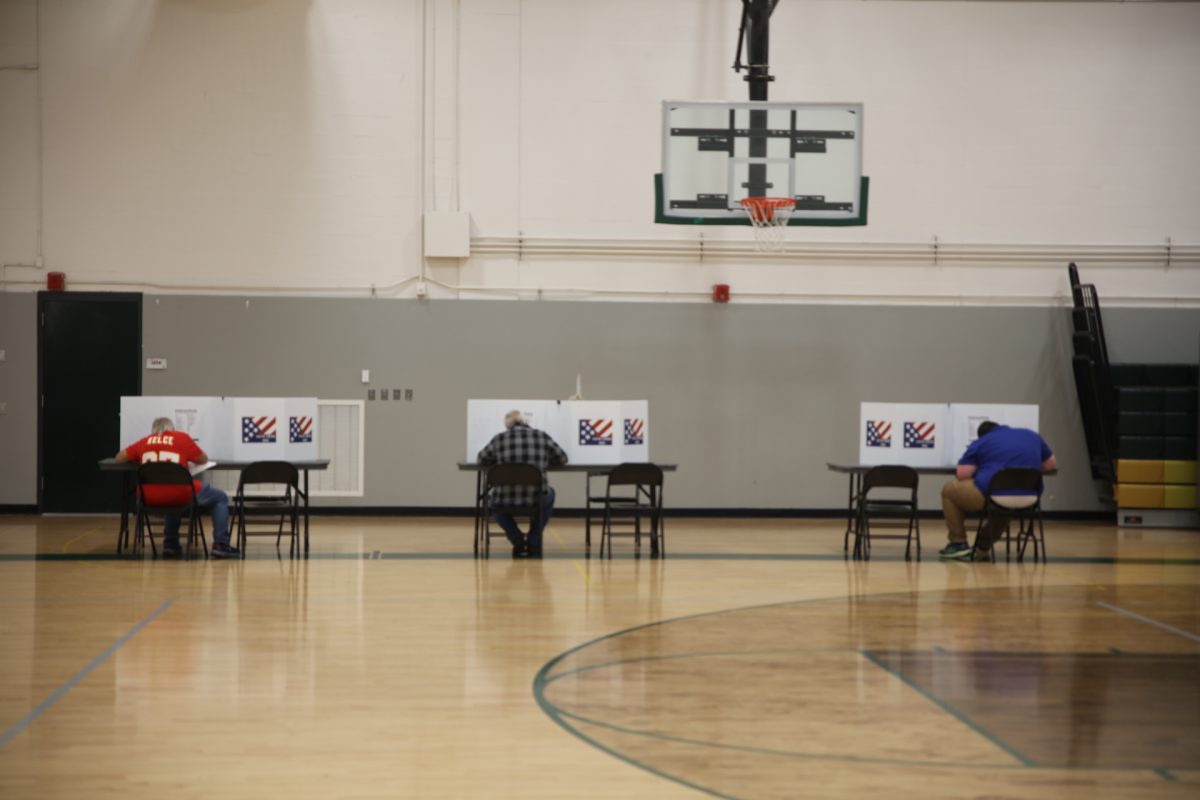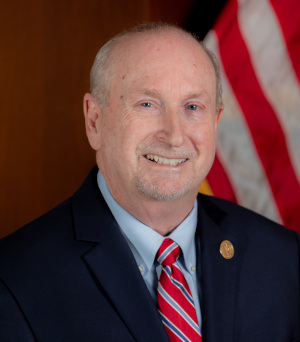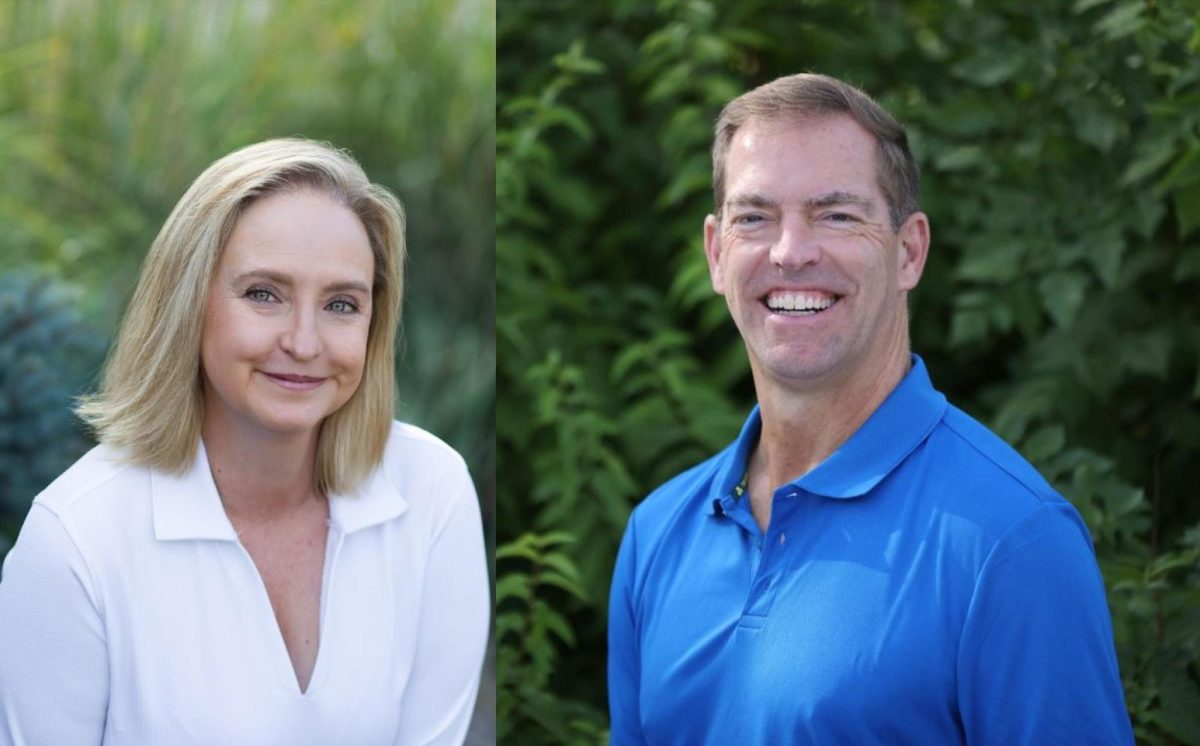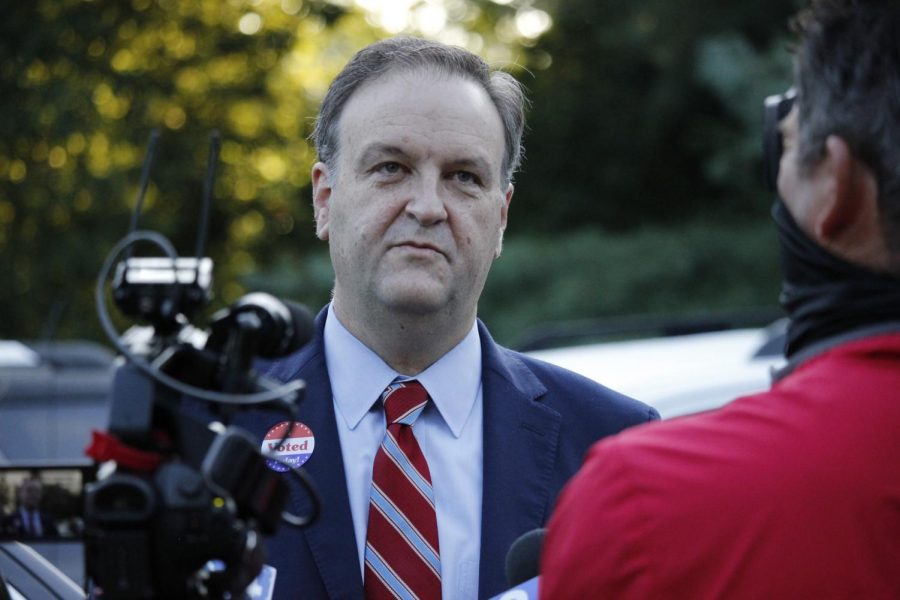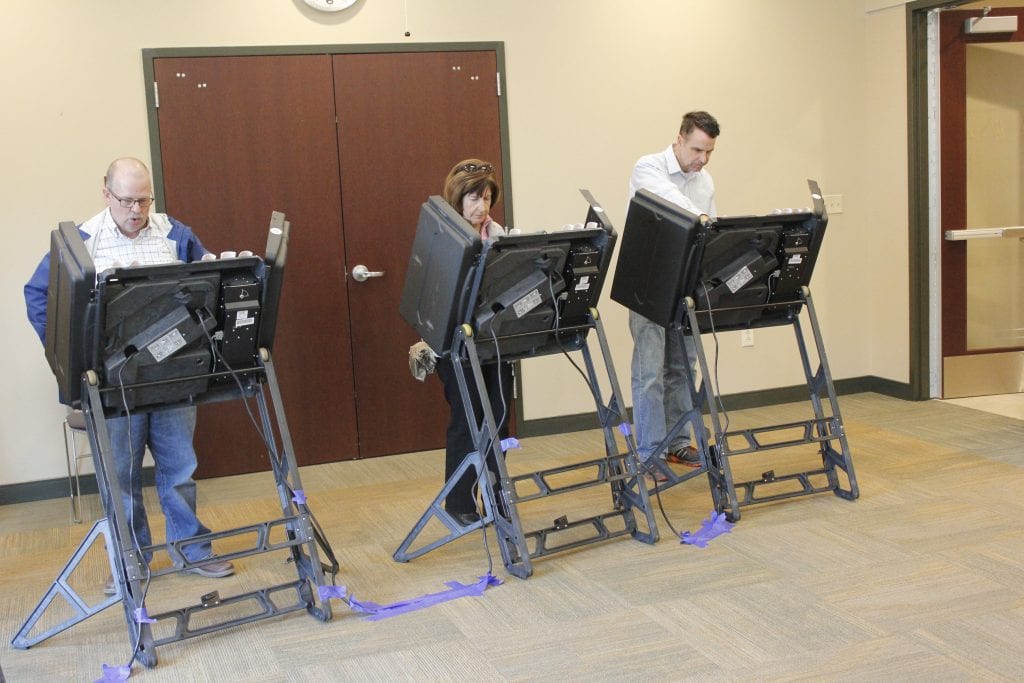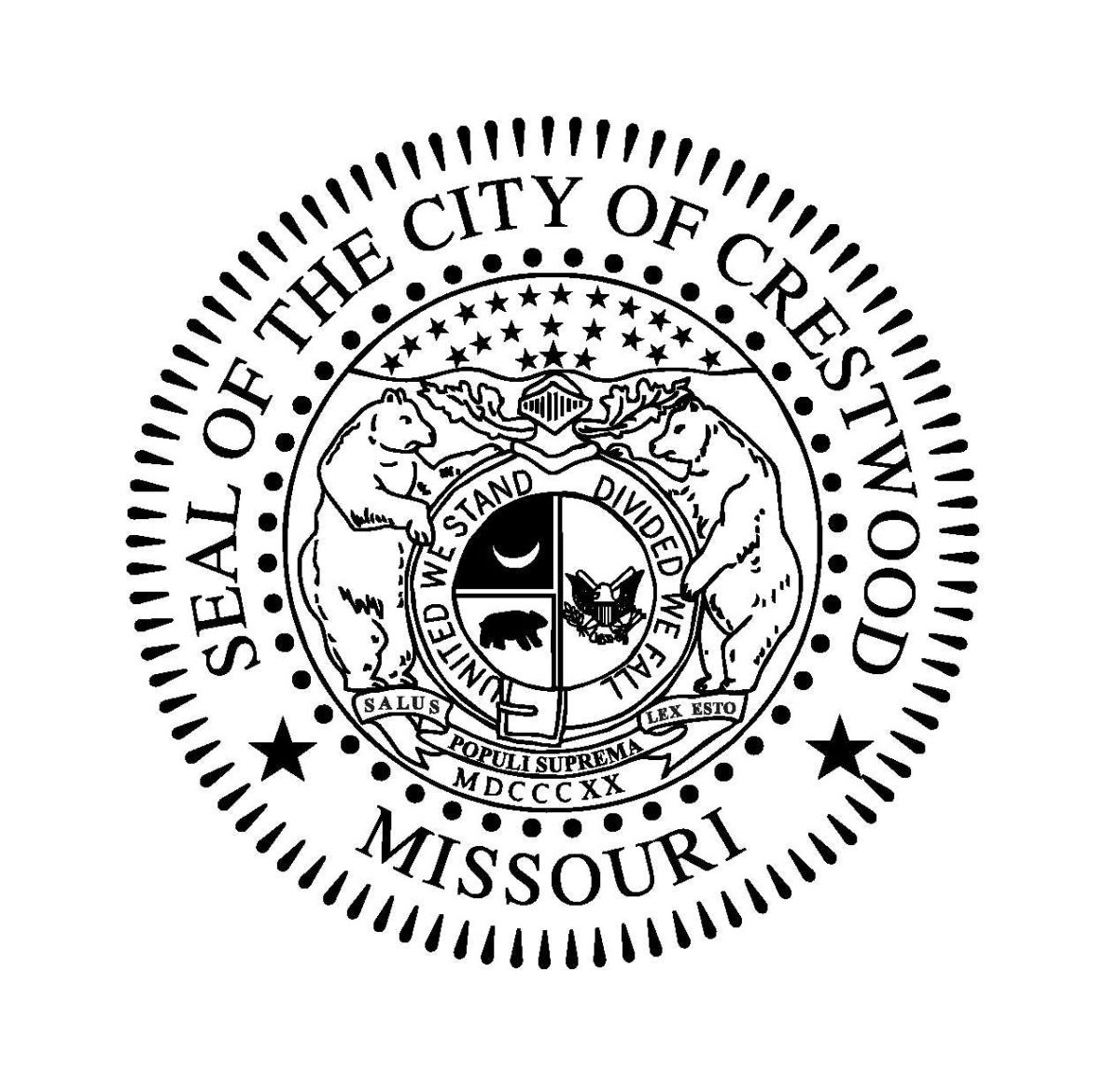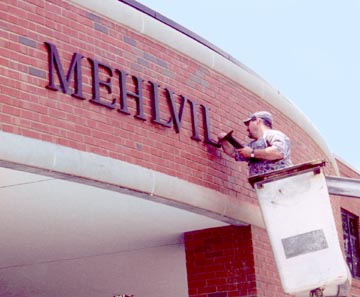Two newcomers to public office are running to replace term-limited Rep. Bob Burns, D-Affton, for his 93rd District seat in the Missouri House of Representatives in the general election next month.
Gabriel Jones and Bridget Walsh Moore are vying for the House seat representing Lemay, parts of Affton and South City in the election Tuesday, Nov. 3. Burns, who is term-limited, is running for the St. Louis County Council.
Jones, 32, 9925 Zenith Dr., Affton, is an insurance agent for the Knights of Columbus. He and his wife, Sarah, have four children, all homeschooled.
Jones studied at Rockhurst University, where he received his Bachelor of Arts degree in political science and economics, and his Master of Business Administration. He formerly taught at St. Mark Catholic Church and is a Missouri State High School Activities Association-certified basketball official.
When asked why he was seeking office, Jones said, “I’m concerned about the world my children will inherit and want to address some of the serious issues facing our region and state.”
Walsh Moore, 4327 Mohegan Drive, Affton, is a customs brokerage agent. She is married to Gregg Moore. She earned her undergraduate degree from Bradley University in international studies and sits on the Metropolitan St. Patrick’s Day Parade Committee.
“I’m running for state representative to give working families in our community a seat at the table in Jefferson City,” Walsh Moore said on why she was running for office.
The candidates gave the following responses to The Call’s candidate questionnaire:
What issue do you consider the single most important issue in this race and why?
Jones: “The single most important issue in this race is not a single issue, but a whole host of interconnected problems. I have talked to thousands of voters in Lemay, Affton and South City, and I regularly hear concerns about burdensome property taxes, empty storefronts, drugs and substance abuse, prostitution, and other types of violent and nonviolent crime in our neighborhoods. I believe these problems are all directly connected to the economic vitality of our region. We need to fuel economic opportunity in our region such that entrepreneurs are encouraged to be industrious, property owners are not burdened by taxes and regulation, and the marginalized do not feel the need to resort to crime.”
Walsh Moore: “To me, health care is the most important issue in this race. Specifically, we have to implement Medicaid expansion to create thousands of health care jobs and increase internet access to over 200,000 Missourians.”
Other issues you perceive in your race and your position on each:
Jones: “The ongoing response to COVID-19 and related fallout is a prime concern among voters in the 93rd District. I have spoken to business owners struggling to make ends meet, residents scared to leave their homes, and individuals worried about the overreach of local governmental authorities. We obviously have a serious public health concern in the spread of coronavirus, but the cost of our collective response has destroyed lives and livelihoods. Voters have told me they want leaders who will take health issues seriously, but with a healthy dose of common sense. On the state level, we will have to deal with the long-term consequences of decreased tax revenue and budget cuts. We will need elected officials who are willing to make tough decisions and do the right thing regardless of party affiliation.”
Walsh Moore: “Supporting public education, protecting workers and creating jobs will be at the top of my agenda in Jefferson City.”
What is your position on abortion?
Jones: “Abortion is the direct and intentional ending of an innocent human life, often through violent means, and as such is a grave moral evil. I am proud to be the only candidate in the 93rd District endorsed by Missouri Right to Life.”
Walsh Moore: “I believe that a woman’s private medical decisions should be left between her and her doctor.”
Would you support legislation to facilitate a merger of St. Louis County and St. Louis city?
Jones: “I would support legislation granting residents of St. Louis County and St. Louis city the ability to vote on a merger because local residents should be the only voters deciding the issue. I would fiercely oppose any attempt to give voters in the rest of the state a say in the structure of our local government.”
Walsh Moore: “The state Legislature should not interfere in such a hyperlocal issue. Any decision about the future of St. Louis County and city should be voted on by the residents of each entity.”
Should there be a statewide mask mandate?
Jones: “No.”
Walsh Moore: “Yes. In order to rebuild our economy and put Missourians back to work, we have to defeat this virus.”
Should police departments be defunded?
Jones: “Absolutely not, and we must ensure our tax dollars are being spent appropriately to support our police departments, not other vague ‘public safety’ measures. When money is intended for the police, it should go to fully fund the police.”
Walsh Moore: “I have a long tradition of law enforcement in my family, so I do not support defunding the police.”
What bill would you sponsor as your first legislation post-election?
Jones: “I would like to sponsor a bill to push back on radical prosecuting attorneys, such as the one in the city of St. Louis, who refuse to do their job of upholding the law and prosecuting criminals.”
Walsh Moore: “As I have said throughout my campaign, health care is my No. 1 issue, specifically making it more affordable. One of the biggest obstacles to affordable health care is the skyrocketing cost of prescription drugs, so my first bill would seek to address this issue. I think that Rep. Deb Lavender’s House Bill 2652, which would allow for a wholesale importation program, is a good model for a bill I would sponsor.”
What changes should Missouri make to its health-care system?
Jones: “As a father of four and a professional in the insurance industry, I know health care is a complex issue and national in scope, such that states have limited power to effect major changes. That said, I would like to see Missouri do creative things to ensure quality, access and cost-effectiveness for consumers. I believe we could do more to give consumers power over where their health care dollars go, and in doing so we could help to drive down costs. Any changes to the health system in Missouri should start with this goal in mind.”
Walsh Moore: “We need to start properly implementing Medicaid expansion. It’s not just a health care issue. It’s about the economic future of our state. Implementing MedEx will provide thousands of new healthcare jobs for Missouri and will help ensure that rural hospitals can stay open. It’s a win-win for patients and doctors alike.”
Are changes needed to the law allowing Missouri citizens to carry concealed weapons? If so, why? If not, why not?
Jones: “Yes, we need to reinstate the licensing and training requirement to carry a concealed weapon in Missouri.”
Walsh Moore: “I’m a strong supporter of the Second Amendment, and I also believe that Missourians should be required to obtain a permit to be allowed to carry concealed weapons in public.”
Read on for web exclusive questions and answers.
What is your position on the death penalty?
Jones: “In principle, the death penalty is a morally legitimate method of protecting the safety of the public from individuals found guilty of violent crimes; however, I have serious reservations about its practical application, cost-effectiveness and ability to deter crime.”
Walsh Moore: “As a Catholic, I am opposed to the death penalty. Moreover, it’s proven to be an ineffective deterrent of crime. I’m focused on promoting common-sense solutions that will keep our community safe.”
What is your position on tax-increment financing?
Jones: “Tax-increment financing amounts to the government picking winners and losers in our economy. But the government’s job is not to hand out special deals. The government’s job is to ensure the ‘rules of the game’ are applied fairly and equitably to everyone. If my mechanic down the street who struggles to make payroll at the end of the month doesn’t get special favors on his property taxes, neither should anyone with a few well-placed connections in local government.”
Walsh Moore: “TIFs should only be given out when the projects being proposed have a clear benefit to the community. We can’t just be handing out tax breaks to millionaire developers at the expense of our public school system.”
Would you support placing a constitutional amendment before voters that, if approved, would repeal the supermajority requirement for school-district bond issues?
Jones: “I am generally skeptical of attempts to amend our state Constitution on any issue. When it comes to this particular question of a supermajority requirement for school-district bond issues, it seems to me that the implications of major public funding questions should necessitate a higher threshold for approval.”
Walsh Moore: “If the public wants to put repealing the supermajority requirement on the ballot, then they should be the ones who have the final say in retaining it or repealing it.”
Are changes needed to the state’s foundation formula for funding education?
Jones: “Yes, the formula is not only cumbersome but is outdated in the age of virtual education and COVID-19, due to its emphasis on daily attendance. Funding for education is complicated because everyone naturally wants more money, but our funding formula needs to be responsive to the changing dynamics in the field of education. Furthermore, a strong argument can be made that the reliance on property taxes inherent in the formula rewards high property wealth areas and negatively impacts areas with low property wealth, which are often areas with high proportions of minority and/or immigrant population.”
Walsh Moore: “While I’m happy that the Legislature has fully funded the state’s foundation formula in recent years, the formula doesn’t paint the full picture on public education in Missouri. The reality is that many districts in our state are dealing with four-day school weeks, underpaid teachers and inadequate school bus transportation. One of my top priorities in Jefferson City will be helping increase the minimum salary requirements for Missouri’s public school teachers.”
Are changes needed to the state’s Open Meetings and Records Law? If so, what would you propose?
Jones: “We need to consider changes based on the coronavirus-induced trend of virtual or ‘remote’ meetings, and I’m open to further discussion and debate on the topic as to the most advantageous means of protecting the public’s right to participate in open meetings.”
Walsh Moore: “I support keeping meetings, votes, records, etc., of the government open to the public. The public is better served when they can objectively observe the deal of the elected officials that their tax dollars support.”
What do you propose to generate revenue for road and bridge improvements?
Jones: “We have the seventh largest highway system in the country but rank near the bottom in revenue, so we must figure out a way to increase funding. Even though voters rejected a gas tax increase in 2018, I think such an increase remains the best method for funding road and bridge improvements. I would not be opposed to a special sales tax, or some other use tax to capture revenue from the high volume of out-of-state traffic through Missouri. Toll roads have been floated as an idea, but would require federal government intervention and might not be the quickest way to raise desperately needed funds.”
Walsh Moore: “Missouri has the country’s seventh largest highway system, yet we’re near the bottom of the pack when it comes to funding. I would support a modest gas tax increase to help generate revenue from our roads and bridges. I don’t support taking funds away from public education to pay for these improvements, as some members of the House and Senate have proposed.’
Are changes needed to the state’s eminent domain laws to prevent abuse?
Jones: “Eminent domain should never be used for commercial projects or private financial gain, and I would favor tightening restrictions to ensure it is only used for public projects that advance the common good.”
Walsh Moore: “I certainly respect the rights of property owners and believe the eminent domain should only be employed when there is a clear and immense public benefit.”
What will you do to improve Missouri’s economy?
Jones: “As one of 163 state representatives, I would not have any power to singlehandedly improve our economy. However, I would actively work to support legislation that would create greater economic opportunity for more Missourians. I want to support responsible economic development, so that means we need to fuel economic opportunity in our region such that entrepreneurs are encouraged to be industrious, property owners are not burdened by taxes and regulation, and the marginalized do not feel the need to resort to crime.”
Walsh Moore: “I want to help make Missouri a trade leader. We were the 26th largest state exporter of goods in 2018. I think we should be aiming for much higher than that. We need to be incentivizing companies to reopen manufacturing in Missouri, so we can become a leader in exports and start controlling our own economic destiny as a state.”
Do you support the changes the Legislature made to the Sunshine Law in 2019, including exempting some legislative records?
Jones: “I believe in responsive and responsible government, so ensuring transparency by those in government is critical. However, protecting the privacy of constituents is also important, and so being able to redact personal information about constituents is a reasonable change that I support.”
Walsh Moore: “I do not. We should be making it easier for the public to know about the work of their elected officials, not harder.”
What do you think of the leadership of Gov. Mike Parson?
Jones: “Gov. Parson has provided steady leadership for Missouri through a tumultuous time after the chaotic departure of the previous governor and during this unprecedented pandemic.”
Walsh Moore: “Leadership? Leaders don’t hire their friends for no-bid consulting contracts and charge the taxpayers $800,000 for it. Leaders don’t threaten to sign Right-to-Work after the public overwhelmingly votes to reject it. Leaders don’t spend taxpayer dollars on private plans. Mike Parson has overwhelmingly failed the test of leadership.”
What will or have you done to work across the aisle in Jefferson City?
Jones: “Common sense and good ideas don’t have political parties, so I’m in favor of working with anyone who genuinely wants the best for our state and isn’t blinded by partisan politics or is content merely doing more of the same things that have always been done.”
Walsh Moore: “My job as a state representative is to get things done, so I’ll work with anyone willing to collaborate on legislation that will improve the lives of my constituents. One area where I see a great deal of potential for bipartisan collaboration is on infrastructure. Republican, Democrat, or independent, everyone in Missouri wants better roads and bridges.”
Should there be a Transparency Division created within the office of the Missouri Attorney General for the sole purpose of prosecuting violations of Public Records and Public Meetings statutes?
Jones: “I am hesitant to create any additional bureaucracy in state government.”
Walsh Moore: “Yes. The more pressure we put on politicians to be transparent with the public, the better.”
Should the Missouri Attorney General be given subpoena power to investigate Sunshine Law violations?
Jones: “The Attorney General should not be deprived of any otherwise legal method for investigating any violations under its jurisdiction.”
Walsh Moore: “I would support giving the Attorney General subpoena power to investigate Sunshine Law violations, but we are going to need a new attorney general who’s actually interested in ending corruption for these changes to mean anything.”
With fewer than 50 percent of rural Missourians having access to high-speed internet service, should Missouri’s newspapers continue to be the medium in which all public notices required by law are published and distributed in print to provide due process to those persons affected by the public notices?
Jones: “Yes, but I think we can and should find additional methods by which we distribute public notices given that we live in the 21st century.”
Walsh Moore: “Given how stark the digital divide is in our state, I don’t think it makes sense to transfer the requirement of public notices away from Missouri’s newspapers.”
Should members and staff of all public governmental bodies (including state, county and local, and public colleges and universities) be prohibited from downloading or using software designed to send encrypted messages by electronic means that automatically self-destruct on communication devices purchased with public money? In other words, should the Confide app or other such software be prohibited from use because such apps are capable of destroying public records that should be available to citizens?
Jones: “I am opposed to such secretive apps being used for public business.”
Walsh Moore: “I want to help make our state government as transparent as possible, so I believe that government officials and their staff should be prohibited from sending encrypted messages in apps like Confide or Signal.”
Do you support right-to-work legislation?
Jones: “Missourians soundly defeated right-to-work at the ballot box, and I do not expect to see any legislation pertaining to the issue when elected to the Missouri General Assembly.”
Walsh Moore: “I strongly oppose right-to-work legislation, and I’m the only candidate in this race who has been vocal about my opposition. It’s well documented that states with right-to-work have lower wages than states that don’t. I joined 67 percent of Missouri voters in voting down right-to-work in 2018, and I’ll fight like hell to make sure we keep it out of Missouri forever.”
What do you think of the state’s COVID-19 response?
Jones: “I am glad the state never imposed any sweeping mandates in response to COVID-19, but I wish the state had done a better job explaining our increased capacity of ventilators and PPE (personal protective equipment) to handle the pandemic. Missourians could have been a little more confident knowing that resources were available for them if they fell ill and needed care.”
Walsh Moore: “The state’s COVID response has been one of the worst in the nation. We have never been able to get the virus under control for even a short amount of time. Our test positivity rate is still one of the highest in the U.S., which tells me two things. 1) We still don’t have the testing capacity to get the virus under control. 2) The lack of consistent strategy from our state government continues to hurt us to this day. We need to start listening to scientist and health professionals to improve as a state.”
Do you support the changes to “Clean Missouri” that are on the ballot as Amendment 3?
Jones: “‘Clean Missouri’ was an ill-conceived proposal from the beginning. Rather than address the root causes of the perceived corruption in Jefferson City, which are an entrenched two-party system and term limits that are too short, so-called ‘Clean Missouri’ changed the existing criteria for drawing state legislative districts. The old rules emphasized the time-tested criteria of compact and contiguous districts, but the new rules prioritize partisan fairness. This will result in even worse gerrymandering, less responsive elected representatives and will further entrench the two-party system.”
Walsh Moore: “I do not. Voters already passed historic ethics reform in 2018. Amendment 3 is an attempt by career politicians to protect their lobbyist friends and trick voters into weakening Missouri’s ethics laws. I’m encouraging everyone I know to vote no on Amendment 3 in November.”



